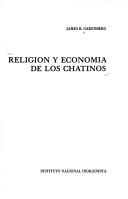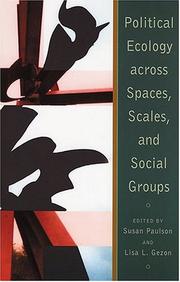| Listing 1 - 10 of 11 | << page >> |
Sort by
|
Year: 1993 Publisher: Oaxaca, Oax. Centro de Investigaciones y Estudios Superiores en Antropología Social
Abstract | Keywords | Export | Availability | Bookmark
 Loading...
Loading...Choose an application
- Reference Manager
- EndNote
- RefWorks (Direct export to RefWorks)
Book
ISBN: 0520041356 Year: 1981 Publisher: Berkeley University of California Press
Abstract | Keywords | Export | Availability | Bookmark
 Loading...
Loading...Choose an application
- Reference Manager
- EndNote
- RefWorks (Direct export to RefWorks)
Book
Year: 1993 Publisher: Oaxaca, Oax. Centro de Investigaciones y Estudios Superiores en Antropología Social
Abstract | Keywords | Export | Availability | Bookmark
 Loading...
Loading...Choose an application
- Reference Manager
- EndNote
- RefWorks (Direct export to RefWorks)

ISBN: 968822071X Year: 1987 Publisher: México, D.F. Instituto Nacional Indigenista
Abstract | Keywords | Export | Availability | Bookmark
 Loading...
Loading...Choose an application
- Reference Manager
- EndNote
- RefWorks (Direct export to RefWorks)

ISBN: 0822336855 9780822336853 0822336723 9780822336723 9786613022400 1283022400 0822388146 Year: 2006 Publisher: Durham: Duke university press,
Abstract | Keywords | Export | Availability | Bookmark
 Loading...
Loading...Choose an application
- Reference Manager
- EndNote
- RefWorks (Direct export to RefWorks)
A collection of ethnographies grounded in second-generation political ecology, which focuses on the interchanges between nature and culture, and the local and the global.
Political ecology --- Human ecology --- Political ecology. --- Human ecology. --- Ecology --- Environment, Human --- Human beings --- Human environment --- Ecological engineering --- Human geography --- Nature --- Social ecology --- Green movement --- Social aspects --- Effect of environment on --- Effect of human beings on
Book
ISBN: 9781498545785 1498545785 Year: 2017 Publisher: Lanham : Lexington Books,
Abstract | Keywords | Export | Availability | Bookmark
 Loading...
Loading...Choose an application
- Reference Manager
- EndNote
- RefWorks (Direct export to RefWorks)
In this book, James B. Greenberg and Thomas K. Park take an anthropological approach to the economic history of the past one thousand years and define credit as a potentially transformative force involving inequalties, rather than an exchange of equal valued commodites. Guiding readers through the medieval period all the way to the modern day, and tracking through the Mediterranean and Europe, Greenberg and Park reorient financial history and position social capital and ethical thought at its center. They examine the multicultural origins of credit and finance, from banking to credit cards and predatory lending, and bringing us up to date, they explore the forces that led to the collapse of global credit markets in 2007–2008. This book is recommended for scholars of anthropology, history, economics, religion, and sociology
Finance --- History. --- History --- Economic history
Book
ISBN: 1498545793 Year: 2017 Publisher: Lanham, Maryland : Lexington Books,
Abstract | Keywords | Export | Availability | Bookmark
 Loading...
Loading...Choose an application
- Reference Manager
- EndNote
- RefWorks (Direct export to RefWorks)
Book
ISBN: 1498545831 Year: 2017 Publisher: Lanham, Maryland : Lexington Books,
Abstract | Keywords | Export | Availability | Bookmark
 Loading...
Loading...Choose an application
- Reference Manager
- EndNote
- RefWorks (Direct export to RefWorks)
In The Roots of Western Finance, Thomas K. Park and James B. Greenberg take an anthropological approach to origins of western finance and credit in ancient societies, covering a period of five thousand years from ancient Mesopotamia to the Islamic world in the eleventh century. Park and Greenberg reveal that credit is not simply an economic transaction; it is a social relationship and a technology of power.
Commerce --- Finance --- Economic history. --- History, Ancient. --- History
Book
ISBN: 1607321718 145711741X 1457117436 1607321726 9781607321729 9781457117411 9781607321712 9781457117435 Year: 2012 Publisher: Boulder, Colo. University Press of Colorado
Abstract | Keywords | Export | Availability | Bookmark
 Loading...
Loading...Choose an application
- Reference Manager
- EndNote
- RefWorks (Direct export to RefWorks)
Commercial products -- Mexico. --- Mexico -- Economic policy -- 21st century. --- Mexico -- Foreign economic relations. --- Mexico -- Social conditions -- 21st century. --- Neoliberalism -- Mexico. --- Working class -- Social conditions. --- Neoliberalism --- Commercial products --- Working class --- Business & Economics --- Economic History --- Social conditions --- Social conditions. --- Mexico --- Economic policy --- Foreign economic relations. --- Commons (Social order) --- Labor and laboring classes --- Laboring class --- Labouring class --- Working classes --- Commodities --- Economic goods --- Merchandise --- Products, Commercial --- Neo-liberalism --- Employment --- Meksiko --- Stany Zjednoczone Meksyku --- Meksyk --- Estados Unidos Mexicanos --- Meḳsiḳe --- Mexique (Country) --- Messico --- Méjico --- República Mexicana --- United States of Mexico --- United Mexican States --- Anáhuac --- メキシコ --- Mekishiko --- מקסיקו --- Commodity exchanges --- Liberalism --- History. --- Commodities exchange --- Commodity markets --- Exchanges, Commodity --- Exchanges, Produce --- Produce exchanges --- Futures market --- Produce trade --- Speculation --- Social classes --- Labor --- Maxico --- Manufactures --- Substitute products --- Contracting out


ISBN: 1283591979 9786613904423 0813542545 9780813542546 0813534771 9780813534770 081353478X 9780813534787 Year: 2004 Publisher: New Brunswick, NJ
Abstract | Keywords | Export | Availability | Bookmark
 Loading...
Loading...Choose an application
- Reference Manager
- EndNote
- RefWorks (Direct export to RefWorks)
Environmental issues have become increasingly prominent in local struggles, national debates, and international policies. In response, scholars are paying more attention to conventional politics and to more broadly defined relations of power and difference in the interactions between human groups and their biophysical environments. Such issues are at the heart of the relatively new interdisciplinary field of political ecology, forged at the intersection of political economy and cultural ecology. This volume provides a toolkit of vital concepts and a set of research models and analytic frameworks for researchers at all levels. The two opening chapters trace rich traditions of thought and practice that inform current approaches to political ecology. They point to the entangled relationship between humans, politics, economies, and environments at the dawn of the twenty-first century and address challenges that scholars face in navigating the blurring boundaries among relevant fields of enquiry. The twelve case studies that follow demonstrate ways that culture and politics serve to mediate human-environmental relationships in specific ecological and geographical contexts. Taken together, they describe uses of and conflicts over resources including land, water, soil, trees, biodiversity, money, knowledge, and information; they exemplify wide-ranging ecological settings including deserts, coasts, rainforests, high mountains, and modern cities; and they explore sites located around the world, from Canada to Tonga and cyberspace.
Political ecology --- Social ecology --- Green movement --- Case studies.
| Listing 1 - 10 of 11 | << page >> |
Sort by
|

 Search
Search Feedback
Feedback About UniCat
About UniCat  Help
Help News
News